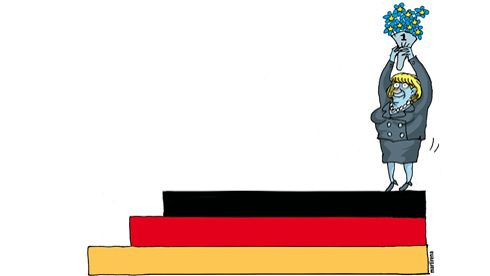The Germans have voted. Their European partners, who allegedly awaited the elections to a new Bundestag with the nervousness of an Englishman awaiting the penalty shootout in a major international football match, can breathe out again: it is over and done with, even if the most exciting phase for both players and onlookers – the cobbling together of a new government in Berlin – is still to come.
The tension that lies in the question of who is likely to end up holding the reins of political power in the heart of Europe is not unjustified. It is bound up, after all, with the events and the experiences of the past four years, stamped by the European sovereign debt crisis, by the worry over the state of the monetary union and the row over how the euro could be permanently secured. Germany has played an important role in that, a role many would label as critical and dominant.
This content has been removed under request of the copyright owner.
After the ballot
Reforms, but with whom?
"Angela Merkel must now come out of hiding," suggests German daily Die Welt following the September 22 general election. For the paper,
after this electoral victory, the Chancellor has nothing to lose. She should use the next few years in power to undertake reforms in Europe and in her country. The Germans like Merkel because she is discrete and seems to do her job without narcissism and without bothering her fellow citizens. But will this be enough?
"Angie" is certainly in position to form a government but "Who still wants to form a coalition with Merkel?" wonders German weekly Stern, because the Chancellor is in the habit of crushing her coalition partners:
following the 2009 Grand Coalition, the Social Democrats [SPD] fell; in 2013, it has cost the liberals [FDP] their seats in Parliament. It would therefore be a great challenge for the SPD to convince its members to form a new grand coalition. Yet, it is the most probable of solutions, given the red [left] – green majority in the Bundesrat [the upper-house of parliament].
Was this article useful? If so we are delighted!
It is freely available because we believe that the right to free and independent information is essential for democracy. But this right is not guaranteed forever, and independence comes at a cost. We need your support in order to continue publishing independent, multilingual news for all Europeans.
Discover our subscription offers and their exclusive benefits and become a member of our community now!












